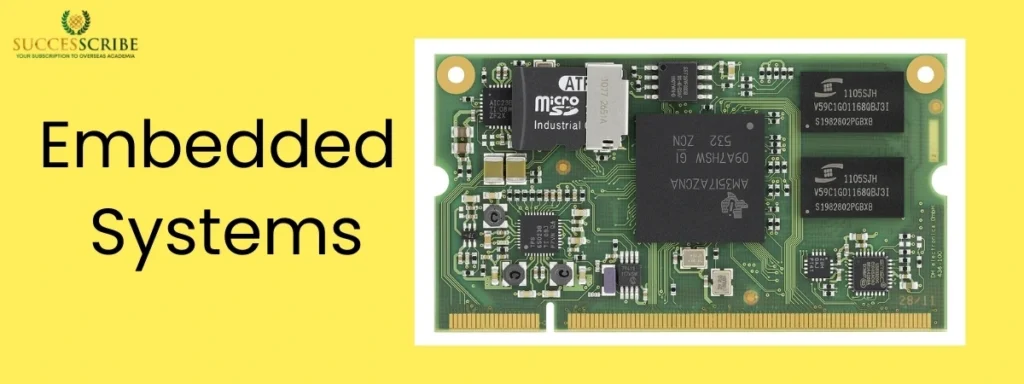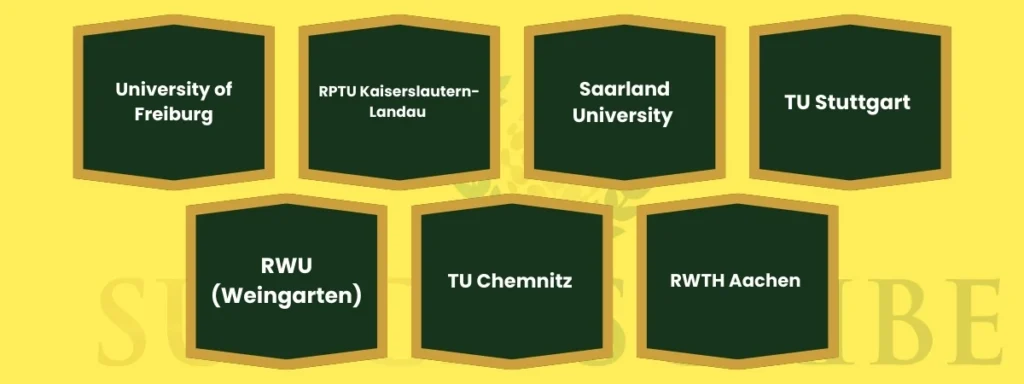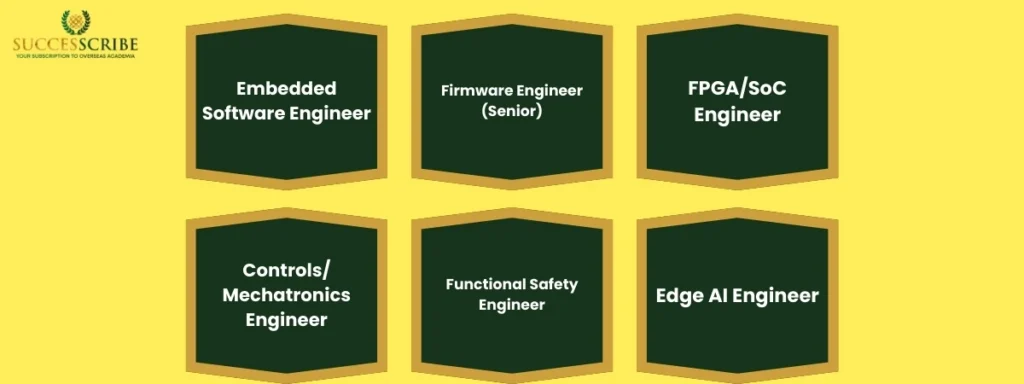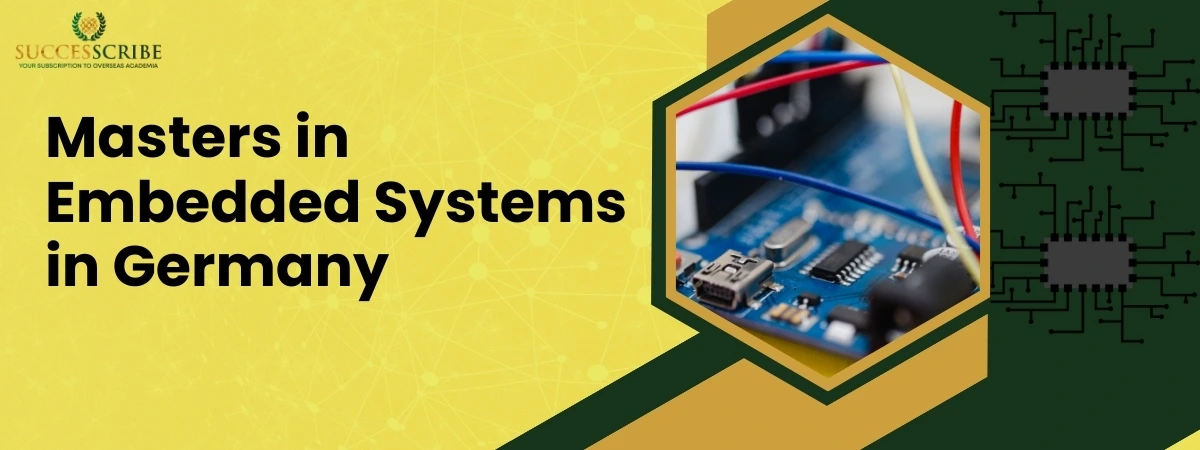Germany is the European hub for automotive electronics, Industry 4.0, robotics, medical devices, and IoT, which directly translates into internships, theses with industry, and high-quality jobs in embedded software, firmware, DSP, and cyber-physical systems. A standout advantage is that most public universities charge little or no tuition, with a few state-level exceptions . Median earnings across Germany give a sense of market context: the national median gross salary is €45,800/year , and engineers are among the stronger-earning groups. Pursuing a Masters in Embedded Systems in Germany gives international students access to world-class universities, cutting-edge research, and a thriving technology-driven job market.
Key Highlights
- Why Germany: world-class engineering education, strong industry in automotive, automation, aerospace and hardware, low or no tuition at many public universities, strong internship & research opportunities
- Typical degree: M.Sc. (1.5–2 years / 3–4 semesters) or specialized Master of Engineering; many programs available in English. Example programs: University of Freiburg, Saarland University, TU Chemnitz, TU Stuttgart.
- Intakes: Most popular – Winter (Sept/Oct). Some programs also have Summer (March/April). Check each university.
- Costs: tuition often €0–€300/semester at public universities (administrative semester fees apply). Living costs typically €850–€1,100 per month (city dependent). Budget for visa proof €10,332–€13,000/year depending on source and semester.
- Post-study work: Graduates can get a job-seeker / post-study residence to find employment (commonly up to 18 months), and with a qualifying job you can switch to a work permit or EU Blue Card.
- Career prospects & salary: Embedded roles are in high demand (automotive, IoT, medical devices). Typical starting salaries for embedded engineers range commonly €40k–€70k (city, employer, experience and German language skills affect this).
What is “Embedded Systems” at the Master’s level?

A typical Master’s in Embedded Systems focuses on the intersection of hardware and software. Core topics include:
- Embedded software engineering (bare-metal C/C++, RTOS, device drivers)
- Microcontrollers and SoC design (ARM / RISC-V / FPGA)
- Real-time systems and operating systems (RTOS design, scheduling)
- Embedded Linux and middleware for devices
- VLSI basics, digital/analog interfacing, PCB design and signal integrity (in hardware-lean programs)
- Cyber-physical systems, sensors, IoT, communication protocols (CAN, SPI, I²C, Ethernet), and often an AI/ML for embedded systems elective track
- Lab courses, prototyping projects, and a Master’s thesis (often done with industry partners)
Suggested Post: Daad scholarship for Indian students
Popular program formats & duration for Masters in Embedded Systems in Germany
Most Masters in Embedded Systems in Germany are structured as 2-year full-time programs, offering both theoretical foundations and practical training aligned with industry demands.
| Program Format | Duration | ECTS Credits | Semesters |
| M.Sc. Embedded Systems / Embedded Systems Engineering (e.g., Chemnitz, Saarland) | 2 years ( 24 months) | 120 ECTS | 4 semesters |
| M.Sc. Embedded Systems Engineering (University of Freiburg) | 24 months | 120 ECTS | 4 semesters |
| Joint/Double-Degree (EMECS – European Master in Embedded Computing Systems) | 2 years | 120 ECTS | 4 semesters |
| M.Eng. Embedded Systems (University of Applied Sciences, e.g., Fulda) | 1.5 years (standard 3 semesters) | 90 ECTS | 3 semesters |
| Specialized Tracks (Robotics, Cyber-Physical Systems, IoT) | Typically 2 years | 120 ECTS | 4 semesters |
Top Universities for MS in Embedded Systems in Germany

Several top-ranked universities provide opportunities to pursue a Masters in Embedded Systems in Germany. Here is the list of Top Universities for Embedded system in Germany:
| University / Program | Language | Specializations / Notes | Tuition (Public) |
| University of Freiburg M.Sc. Embedded Systems Engineering (ESE) | English (few electives in German; can do fully in English) | Tracks incl. AI, Cyber-Physical Systems, Circuits & Systems, Biomedical, Photonics | €1,500/semester for non-EU (BW state rule) + semester fee |
| RPTU Kaiserslautern-Landau — M.Sc. Embedded Computing Systems (ESY) | English | Hands-on embedded design, strong industry connections in automotive and automation | Typically no tuition (semester contribution applies) |
| Saarland University M.Sc. Embedded Systems | English | Embedded systems in a top CS research environment | Typically no tuition |
| TU Stuttgart / (embedded/infotech tracks) | English | Major in Embedded Systems Engineering as one of the study tracks; broad EE-CS interdisciplinary approach | €1,500/semester (tuition for non-EU) + standard semester fees |
| RWU (Weingarten) – Master Electrical Engineering and Embedded Systems [M.Eng.] | English | Practice-oriented embedded systems, signal processing, SoC, wireless; 3-semester full-time | €1,500/semester (tuition for non-EU) + semester fee €160; duration: 3 semesters |
| TU Chemnitz – M.Sc. Embedded Systems | English (with A1–A2 German requirement) | Covers real-time, microelectronics, DSP, HW/SW co-design, automotive systems; strong project labs | No tuition; standard semester contribution (€200-€300 typical) |
| TUM – M.Sc. Electrical Engineering & Information Technology (embedded track) | English/German options | EE/IT master with possibility to focus on embedded via elective modules | No tuition Fees €150/semester contribution fee. |
| RWTH Aachen – M.Sc. (EE & IT with embedded focus) | English/German options | Multiple specializations; embedded/CE possible via electives | No tuition Fees €310/semester contribution fee. |
Suggested Post: TOEFL accepting universities in Germany
Admissions: what universities typically expect (eligibility)
To apply for a Masters in Embedded Systems in Germany, students are generally required to meet academic and language criteria. Most German MSc programs in embedded systems expect:
- Relevant bachelor’s degree (B.E./B.Tech/B.Sc.) in Electrical/Electronics Engineering, Electronics & Communication, Computer Engineering/Science, Mechatronics, or closely related discipline. Some programs accept applicants with strong software backgrounds plus relevant project work.
- Minimum grade/GPA: Varies by university. Competitive: upper 50–60% or CGPA 6.5–7/10 (or equivalent). If your transcript doesn’t match, highlight project/industrial experience.
- Proof of English: IELTS 6.5–7.0 or TOEFL iBT 88–100 commonly required for English-taught programs. Some accept Duolingo but check specifics.
- German language: Not always mandatory for English programs, but B1/B2 is useful for internships and part-time work; some technical jobs or smaller employers prefer German.
- GRE: Rarely required for German universities; may help for very competitive programs but not mandatory generally.
- Documents: Bachelor transcript (with course descriptions sometimes required), degree certificate, CV (Europass-style is OK), statement of purpose/motivation letter, two letters of recommendation (academic or academic+industrial), proof of internships/projects, passport copy, possibly a portfolio/GitHub showing embedded projects.
- Assessment / selection: Many programs use GPA + relevancy of coursework + project/internship experience; some may have online interviews for shortlisted applicants.
Always check the university’s official program page for exact minimums and equivalencies — policies vary. For example, TU Chemnitz and University of Freiburg list specific admission requirements on their pages.
Curriculum: What You’ll Study (Typical)
The curriculum of a Masters in Embedded Systems in Germany is designed to balance core concepts with practical applications:
- Foundations: Real-time systems, RTOS, embedded C/C++, microcontroller programming (ARM), hardware/software co-design.
- Digital Design & Architecture: SoC design, FPGA/ASIC (VHDL/Verilog), interfaces (SPI, I²C, CAN), low-power design.
- Signal Processing & Control: DSP for embedded, control systems, sensors/actuators, robotics.
- Security & Safety: Functional safety (ISO 26262), secure boot, cryptography for embedded, formal verification.
- Edge AI & CPS: On-device ML, TinyML, scheduling, synchronization, networked/IoT systems.
- Electives/Tracks (example Freiburg): AI, CPS, Circuits & Systems, Biomedical, Photonics.
Many programs include industry labs, internships, or theses with companies in automotive, robotics, or semiconductors across Bavaria, Baden-Württemberg, NRW, and beyond.
What to look for in program pages
- Course list & lab facilities (FPGA lab, microcontroller lab, measurement equipment)
- Thesis & project structure (industry/supervisor options)
- Language of instruction & exam language
- Tuition/semester fees & scholarships listed
- Average alumni employment sectors & sample partner companies
- Application deadline & required documents page
Fees, Living, and Funding
One of the biggest reasons international students choose Germany for higher studies is the affordability compared to the US, UK, or Canada. Still, it’s important to budget realistically.
| Cost Item | Typical Range / Rule | Notes / Source |
| Tuition (most public universities) | €0 | Semester contribution still applies |
| Tuition in Baden-Württemberg (non-EU) | €1,500/semester | Applies at public universities in BW (e.g., Freiburg, Stuttgart, KA) |
| Semester contribution | €150–€400/semester | Student services + transport (varies by uni/region) |
| Blocked amount (visa) | €992/month = €11,904/year | Official financial proof |
| Deutschlandstipendium | €300/month | Merit-based; national program |
Even if tuition is free, remember to plan for rent, health insurance, food, and transport. The blocked amount is a good baseline, but living in big cities can cost 20–30% more than smaller university towns.
Suggested Post: Total cost of masters in Germany
Scholarships & Funding for Masters in Embedded Systems in Germany

While most public universities in Germany charge little to no tuition fee, international students still need to cover living expenses (approx. €11,904/year – the amount required for the blocked account). To support students, several scholarships and funding options are available:
| Funding Option | Monthly Amount (EUR) | Duration / Notes |
| DAAD Scholarship | €850 – €1,200 | Standard living stipend; can’t rely on it for tuition/semester fees |
| Deutschlandstipendium | Up to €300 | Merit-based, for up to 2 years |
| Studienstiftung | Up to €1,155 (including need-based) | Strongest support; competitive selection |
| BAföG (State Aid) | Up to €934 + €1,000 bonus | Income-dependent; growing availability for international MSc candidates |
| University Scholarships | €200 – €500+ | Depends on university and program; range varies widely |
| Part-Time Work | €400 – €1,200 (est.) | Depends on hours worked (20/week); can cover living/semester costs |
| Combined Support (DAAD + Job) | €1,350 – €1,700+ | Living stipend plus part-time income to cover fees and basic living expenses |
Suggested Post: Scholarships for undergraduates in Germany
Salaries & Careers in Embedded Systems

Germany’s reputation as the home of automotive electronics, robotics, and Industry 4.0 ensures strong career opportunities for embedded system graduates. Most students find roles in automotive, semiconductors, IoT, medical devices, and industrial automation.
Where Do Graduates Work?
- Automotive & Mobility: ECU development, ADAS, AUTOSAR, autonomous driving.
- Industrial Automation & Robotics: PLCs, mechatronics, predictive maintenance systems.
- Semiconductors & Hardware: FPGA/ASIC design, RTL verification, chip-level firmware.
- Medical Devices: Embedded control for real-time healthcare devices, safety compliance.
- IoT & Edge AI: Smart devices, TinyML, gateways, connectivity stacks.
Market Pay
- The national median salary in Germany (all professions) is about €45,800/year.
- Engineers earn significantly higher, averaging €56,000–€65,000/year depending on specialization and experience.
- According to Glassdoor, the average embedded software engineer salary in Germany is €69,000/year, with typical ranges between €59,000 and €83,000.
- Senior roles in tech clusters like Munich, Stuttgart, or Berlin can cross €90,000/year.
Careers & Salary Outlook in Embedded Systems
| Job Role | Core Focus | Salary Range (gross/year) | Typical Employers |
| Embedded Software Engineer | C/C++, RTOS, device drivers, BSPs | €59,000 – €83,000 (avg €69k) | Automotive Tier-1s, IoT startups |
| Firmware Engineer (Senior) | Bootloaders, SoC bring-up, low-level security | €70,000 – €95,000+ | Semiconductors, robotics firms |
| FPGA/SoC Engineer | RTL design (VHDL/Verilog), timing closure, verification | €65,000 – €95,000+ | Chip design companies, R&D labs |
| Controls/Mechatronics Engineer | Control algorithms, robotics, motion systems | €60,000 – €85,000 | Industrial automation leaders |
| Functional Safety Engineer | ISO 26262 compliance, verification & testing | €65,000 – €95,000+ | Automotive OEMs, safety-critical systems |
| Edge AI Engineer | On-device ML, TinyML, optimization for embedded targets | €65,000 – €95,000+ | IoT & AI product companies |
Suggested Post: Average salary after masters in Germany
How to Get Admitted (and Not Miss Anything)
Securing admission to a Masters in Embedded Systems in Germany requires careful planning, timely applications, and attention to all eligibility criteria:
- Map your fit: Shortlist programs (Freiburg ESE, RPTU ESY, Saarland Embedded Systems, TUM EEIT, RWTH EE/CE) based on language, specialization, lab strengths, and location costs.
- Check intake windows: Some allow summer + winter; most are winter only. Consult the DAAD profile and the department page for exact dates.
- Collect documents: Degree transcripts, CV, SoP, LORs, English test, portfolio of embedded projects (GitHub, thesis, competitions).
- India-specific: Apply for APS early (processing can take several weeks). You’ll need it for visa and often for admission.
- Apply: Use the university portal (or uni-assist where required) and upload precise proofs (admit letter, language proof, etc.).
- Blocked account & insurance: Prepare €11,904 and buy health insurance; many banks/fintechs offer student blocked accounts.
- Visa appointment (India): Follow German Missions/VFS checklists for your city; expect processing to take several weeks; refrain from early status emails (missions advise against inquiries within first 3 months).
Visa, Residence & Post-Study Work in Germany
Pursuing a Masters in Embedded Systems in Germany also means understanding visa requirements, residence permits, and the post-study work opportunities available to international graduates.
| Step / Requirement | Details | Numbers & Duration (2025) | Notes for International Applicants (incl. India) |
| Student Visa (National Visa – “D” Type) | Required before arrival for non-EU/EEA students | Visa fee (€75) | Apply via digital portal “di.de”; streamlined process from Feb 2025 |
| Blocked Account (Proof of Funds) | Mandatory financial proof for student visa | €992/month, totaling €11,904/year | Secure via providers like Expatrio; check embassy-specific requirements |
| Health Insurance | Mandatory for enrollment and visa applications | Public insurance: approx. €120–€130/month | Private allowed only if annual salary ≥ €73,800 (not applicable for students) |
| Residence Permit (Aufenthaltstitel) | To be obtained after arrival for study duration | Validity: 1–2 years, renewable to match course length | Apply at local Ausländerbehörde shortly after arrival |
| Part-Time Work During Studies | Permitted to help offset living costs | Up to 120 full days or 240 half days/year | Student jobs (Werkstudent/mini-job) usually pay €10–15/hour |
| Internships (Curricular) | Distinct from the part-time work limit | Duration depends on the program | Often compulsory in engineering programs |
| Post-Study Job-Seeking Permit | After graduation, to look for work in Germany | 18 months duration | Permit allows working full-time during this period |
| EU Blue Card (Highly Skilled Workers) | For graduates who secure relevant employment | Shortage occupations/young grads: €43,759.80/year | Requires relevant job offer; expanded eligibility under Skilled Immigration Act |
| Permanent Residency (Niederlassungserlaubnis) | After working in Germany | Blue Card holders can apply after 2 years of employment (if sufficient German B1) | Faster access to PR than through standard work permit routes |
| German Citizenship | Long-term settlement option | Possible after 5–8 years of residence + integration + B1 German proficiency | Requires successful PR path and meeting residence/language criteria |
Suggested Post: Germany student visa rejection reasons
Parting advice — a few things no one remembers to tell you
- Start GitHub & technical blog now. A short written explanation of each project helps reviewers more than long code dumps.
- Prototype videos help (10–60 seconds) — show your device running. Admissions committees and interviewers love them.
- Be precise in SOP: mention 2–3 faculty names and why you’re a fit (labs, course names, project ideas). Generic SOPs are easy to spot.
- Plan finances early: blocked account vs scholarship options — embassies take time to approve visas.
Conclusion
If you’re an international student, especially from India, planning your future in Embedded Systems, Germany offers a rare blend of affordability, world-class education, innovation-driven research, and lucrative job opportunities. Germany is projected to remain one of the top 3 global destinations for advanced studies in computer engineering and embedded technologies. Unequivocally, yes. A Masters in Embedded Systems in Germany is a transformative investment.
FAQs
Is the degree available fully in English?
Yes, several embedded programs are fully English-taught (e.g., Freiburg ESE can be completed entirely in English; RPTU ESY is taught in English). Always check the latest program page.
Do I have to pay tuition as a non-EU student?
Usually no at public universities – except in Baden-Württemberg where €1,500/semester applies at public institutions (e.g., Freiburg).
How much money do I need for my visa?
In 2025, the blocked amount is €992/month, €11,904/year.
What salaries can I expect after graduating?
Embedded software averages around €69k (Glassdoor, Aug 2025 snapshot), with broader context from national medians. Senior roles in hotspots can exceed €90k. Use current job ads for precise targeting.
Related Post
Benefits of German language course
English taught bachelors degree in Germany
Highest paying companies in Germany
Admission Requirements for masters in Germany















